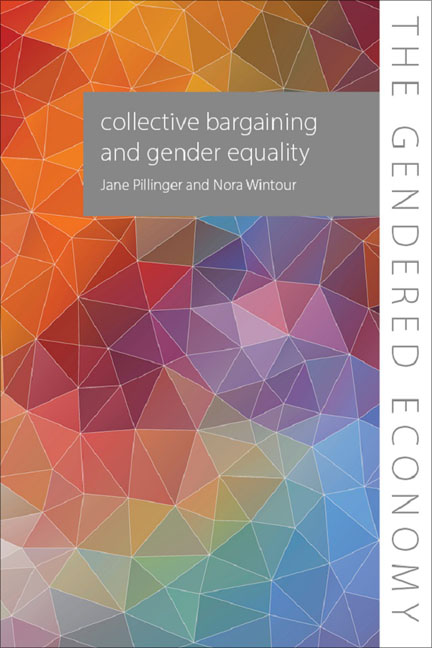Book contents
- Frontmatter
- Dedication
- Contents
- Acknowledgements
- Acronyms
- Foreword
- 1 Introduction
- 2 The gender dimensions of collective bargaining
- 3 Collective bargaining as a tool for gender equality: evidence from across the world
- 4 Changing employment patterns, precarious and informal work, and the challenge for collective bargaining
- 5 The global dimension of collective bargaining: the role of global framework agreements in promoting gender equality
- 6 Conclusion
- References
- Index
5 - The global dimension of collective bargaining: the role of global framework agreements in promoting gender equality
Published online by Cambridge University Press: 09 August 2023
- Frontmatter
- Dedication
- Contents
- Acknowledgements
- Acronyms
- Foreword
- 1 Introduction
- 2 The gender dimensions of collective bargaining
- 3 Collective bargaining as a tool for gender equality: evidence from across the world
- 4 Changing employment patterns, precarious and informal work, and the challenge for collective bargaining
- 5 The global dimension of collective bargaining: the role of global framework agreements in promoting gender equality
- 6 Conclusion
- References
- Index
Summary
This chapter examines existing mechanisms for collective bargaining between multinational enterprises (MNEs) and global union federations (GUFs) as effective spaces for gender equality bargaining. It looks at the role and potential of collective bargaining and ways in which gender equality is promoted through regional and global framework agreements covering workers in MNEs including in global supply chains. Global and regional framework agreements between MNEs and GUFs have been used to promote workers’ rights and gender equality across global supply chains. In the last decade, there has been a marked trend to strengthen gender equality and diversity clauses in these agreements, particularly in female-dominated employment sectors.
In many countries, however, GUFs and their national affiliates are faced with major challenges concerning workers’ rights, including violations of the right to freedom of association and the right to bargain collectively, as documented in the annual Global Rights Index of the International Trade Union Confederation (ITUC 2017). Corporate social responsibility initiatives often fail to respect ILO conventions or address the responsibility of business enterprises for their adverse impacts on human rights in the supply chain and in the local communities (ITUC 2011a). Furthermore, many women work in global production sites in non-unionized export processing zones (EPZs), where contract labour is used to produce goods for global supply chains (ILO 2016a; Morris & Pillinger 2016). As Hadwiger (2015) argues, EPZ workers are typically “female, young, migrant and poor, with no trade union experience and no knowledge of their rights” (14).
WOMEN’S WORK IN GLOBAL PRODUCTION
Women’s employment in MNEs is often of a better quality than in domestic enterprises, and waged work in export factories in the garment sector is an alternative to working in the informal economy (OECD 2008). When women have access to employment, household poverty is reduced and family members have better access to resources that benefit the education and health of other household members (DFID/IDRC 2012; UN Women 2015). However, many women working in global production sites face significant problems of exploitation, low pay, poor working conditions, lack of social protection, long working hours and low union representation.
- Type
- Chapter
- Information
- Collective Bargaining and Gender Equality , pp. 113 - 128Publisher: Agenda PublishingPrint publication year: 2018



